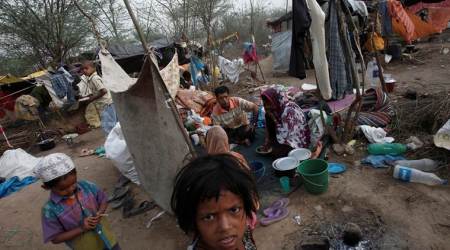 The Rohingya, about 1 million in all, are the world’s most persecuted ethnic Muslim community.
The Rohingya, about 1 million in all, are the world’s most persecuted ethnic Muslim community.
Wir schaffen das (we can do it)”. Those three words with which German Chancellor Angela Merkel opened her country’s doors to refugees from Syria in 2015, at a time when no other country wanted them, dramatically increased Germany’s prestige and stature in the world. Sadly, India does not take its cues from Merkel, who spoke of her country’s historic responsibility in making that decision. Not being a signatory to the 1951 United Nations Convention on the Status of Refugees or its 1967 protocol that lays down the obligations of a host country to those who seek refuge in its territory, India would not be in breach of any international law in turning away the Rohingya people. Nor does it have a domestic law for refugees. Still, India has big power aspirations, and to that end at least, it must act like one.
The Rohingya, about 1 million in all, are the world’s most persecuted ethnic Muslim community. Though they have lived in the Rakhine province of Myanmar, that country has deprived them of citizenship, and restricted their freedom of movement to limit their access to economic opportunities. Over the last year, the Myanmar Army has used attacks by a group calling itself the Arakan Rohingya Salvation Army to launch ever widening crackdowns on the Rohingya. In the last three weeks, tens of thousands have fled Rakhine and crossed the border into Bangladesh. At a time like this, the statement by Minister of State for Home Kiren Rijiju that the government is making plans to “deport” the Rohingya who already live in this country, makes India and Indians seem small-minded and insecure, rather than a nation with a long and confident record of compassion towards people seeking safe haven from persecution in their own countries.
Rijiju ticks off critics by reminding them that India does not need lessons in compassion as it has taken in hundreds of thousands of refugees in the past. But he himself seems to learn no lessons from the times that independent India accepted Tibetans, East Pakistanis, and Sri Lankans, each wave causing some despair, but also reaffirming the country’s faith in itself and its place in the world. The truth is that a BJP-ruled India seems ready to welcome only Hindu refugees fleeing countries where they are a persecuted minority; the Rohingya, being Muslim, do not fit the bill. There may be radicalised Rohingya, and the ARSA is said to have links with the Lashkar-e-Toiba. But it is the job of the intelligence and security apparatus to weed out the bad, so that there is no tarring of an entire community. If India is genuinely concerned about the influx, Prime Minister Narendra Modi should have told Myanmar during his visit there not to drive out the Rohingya.

